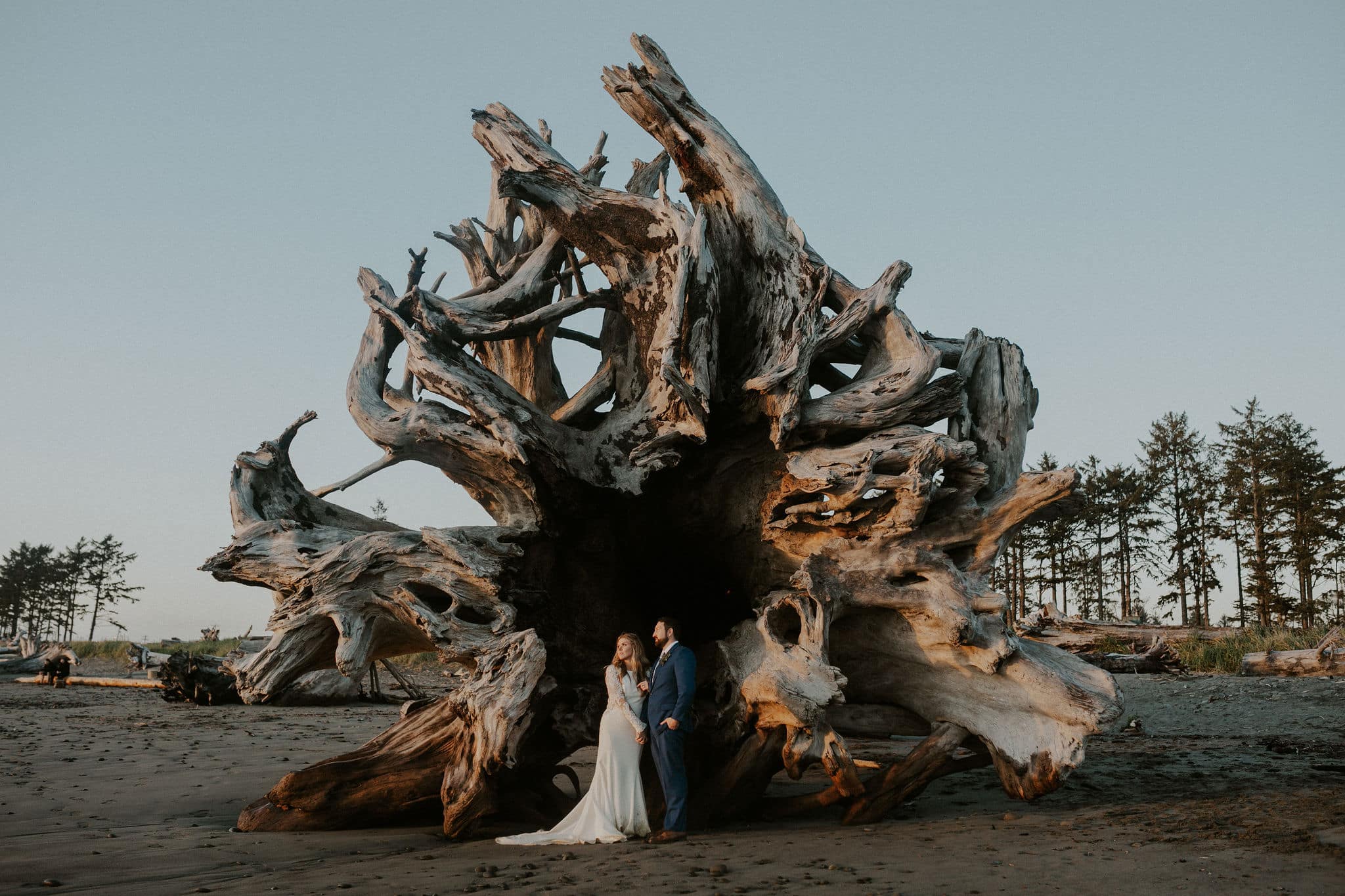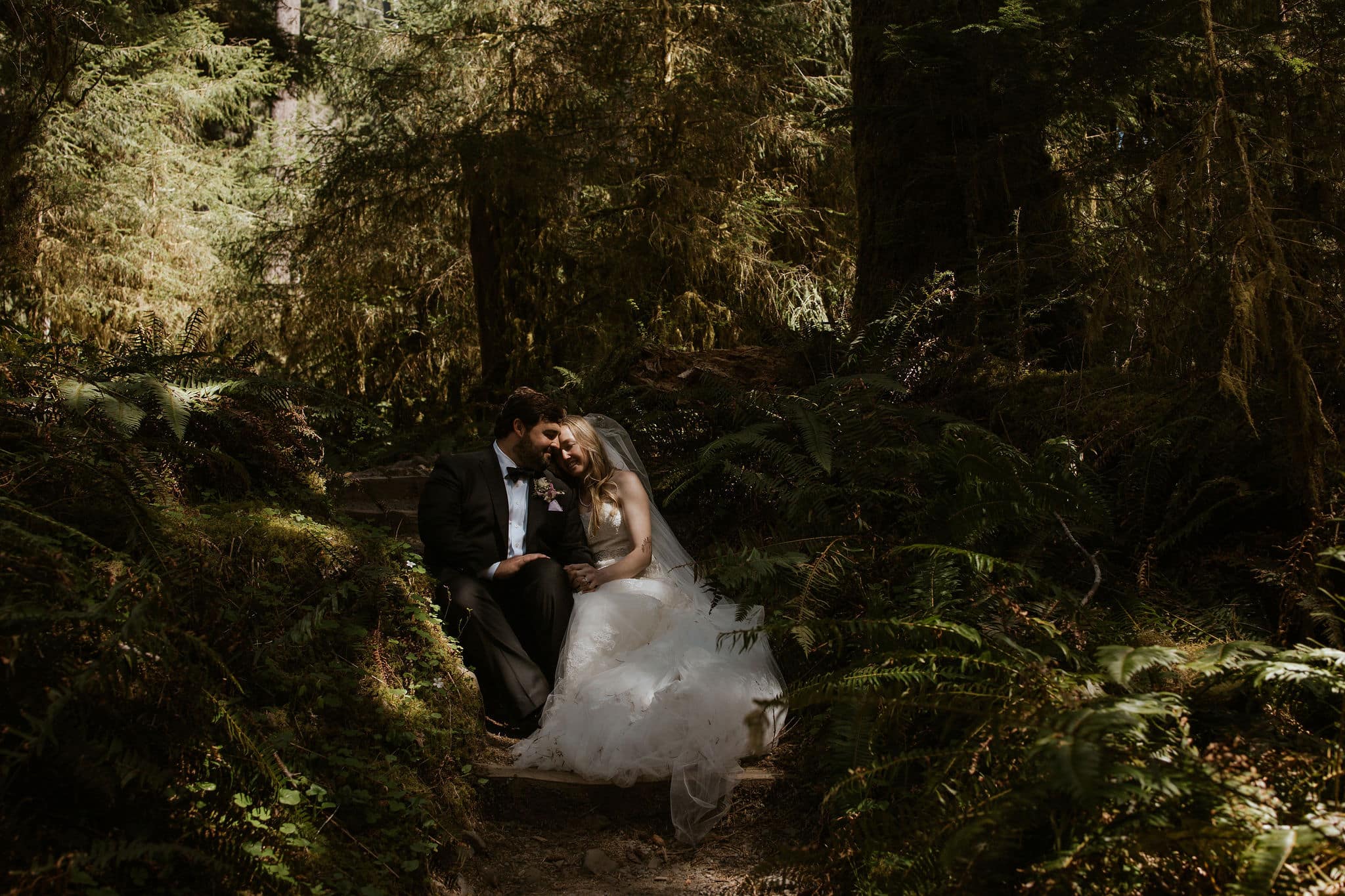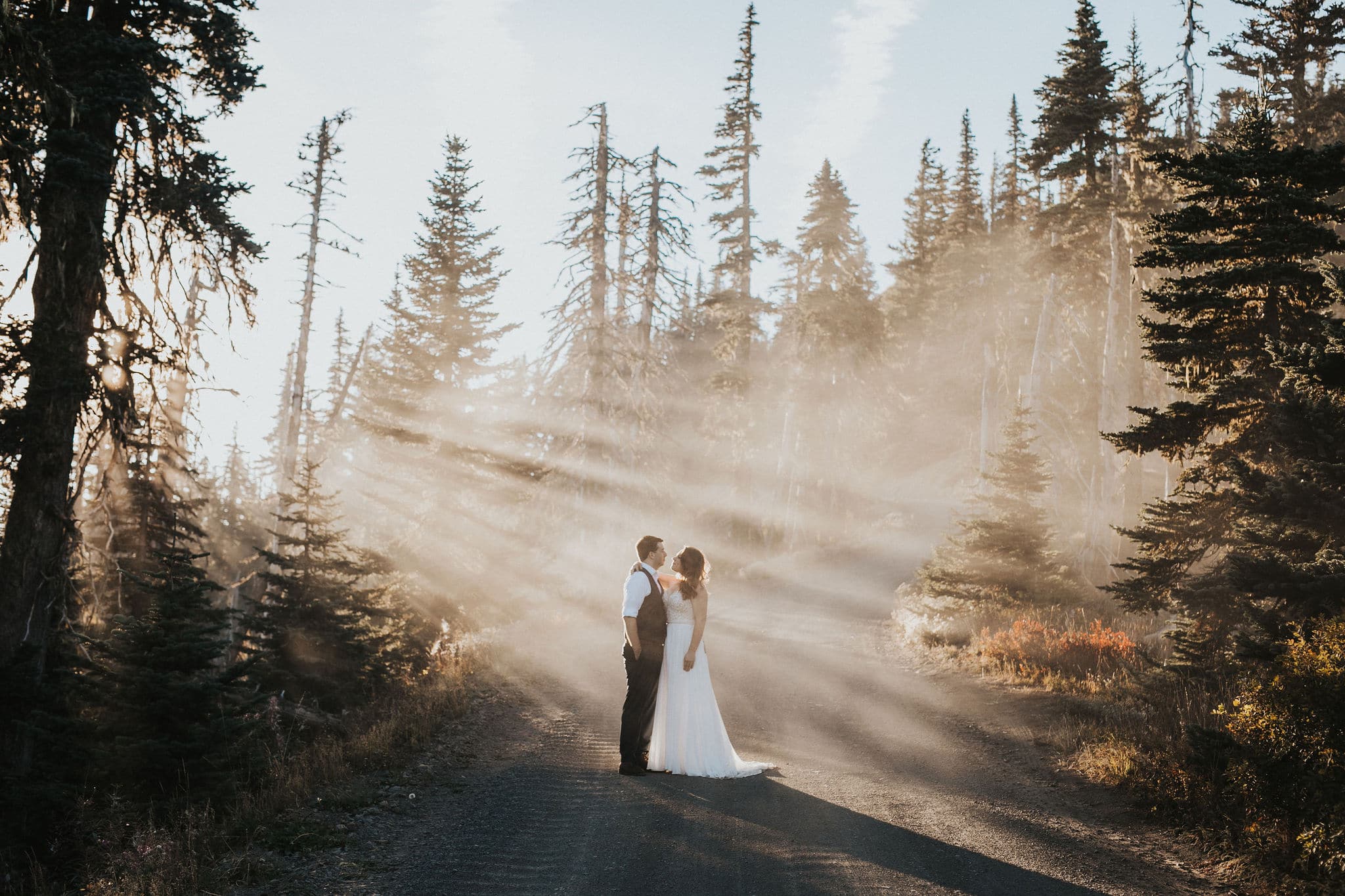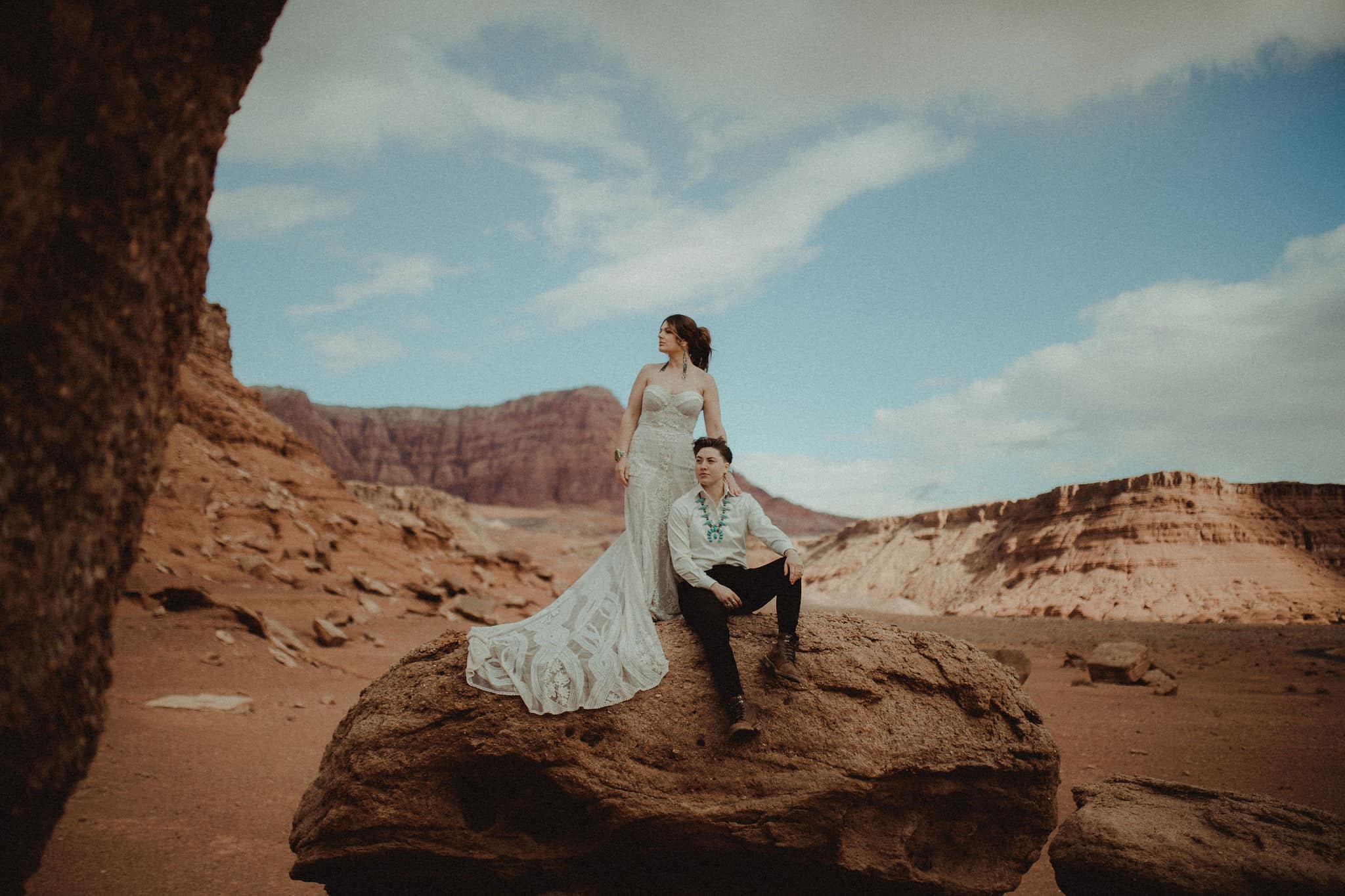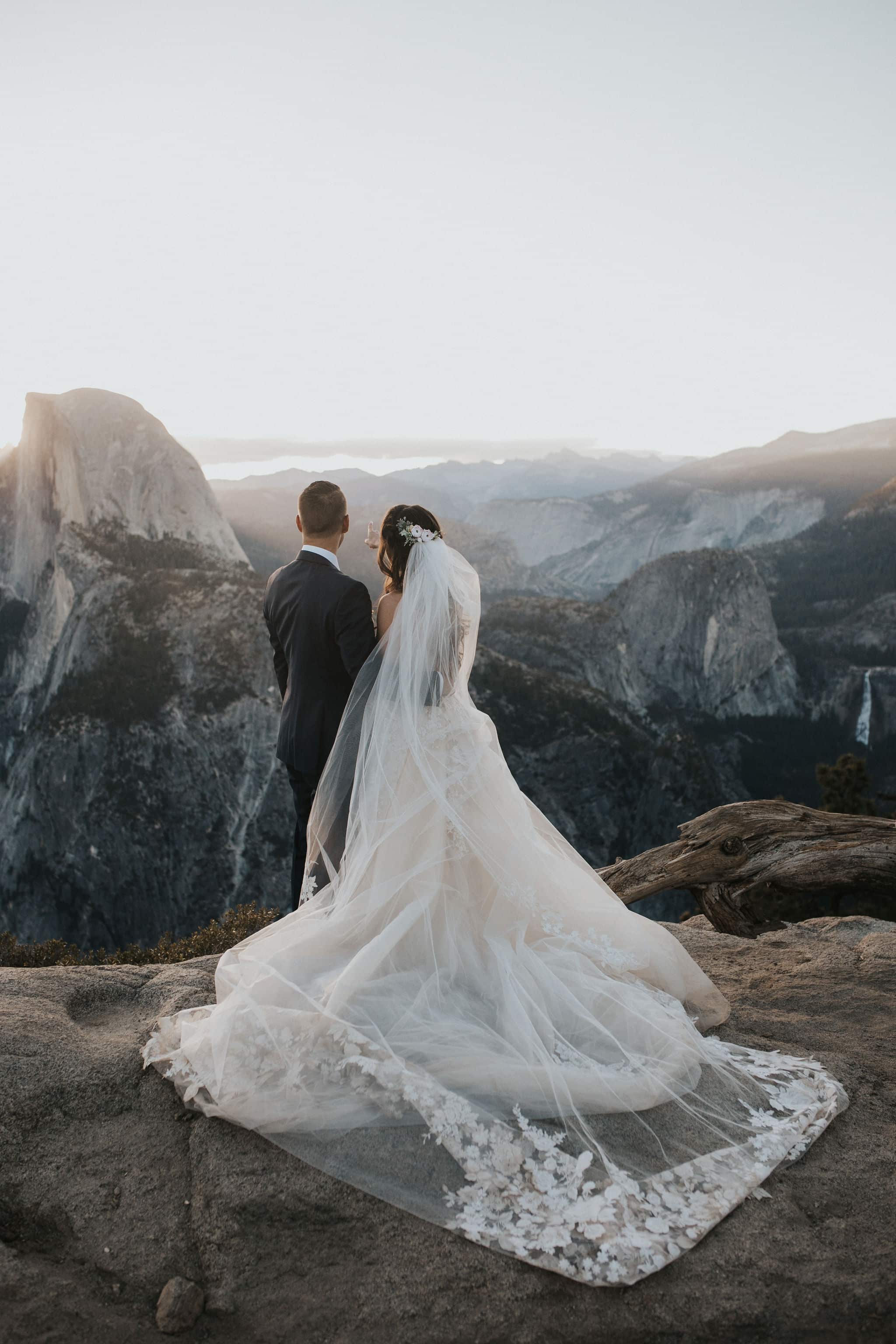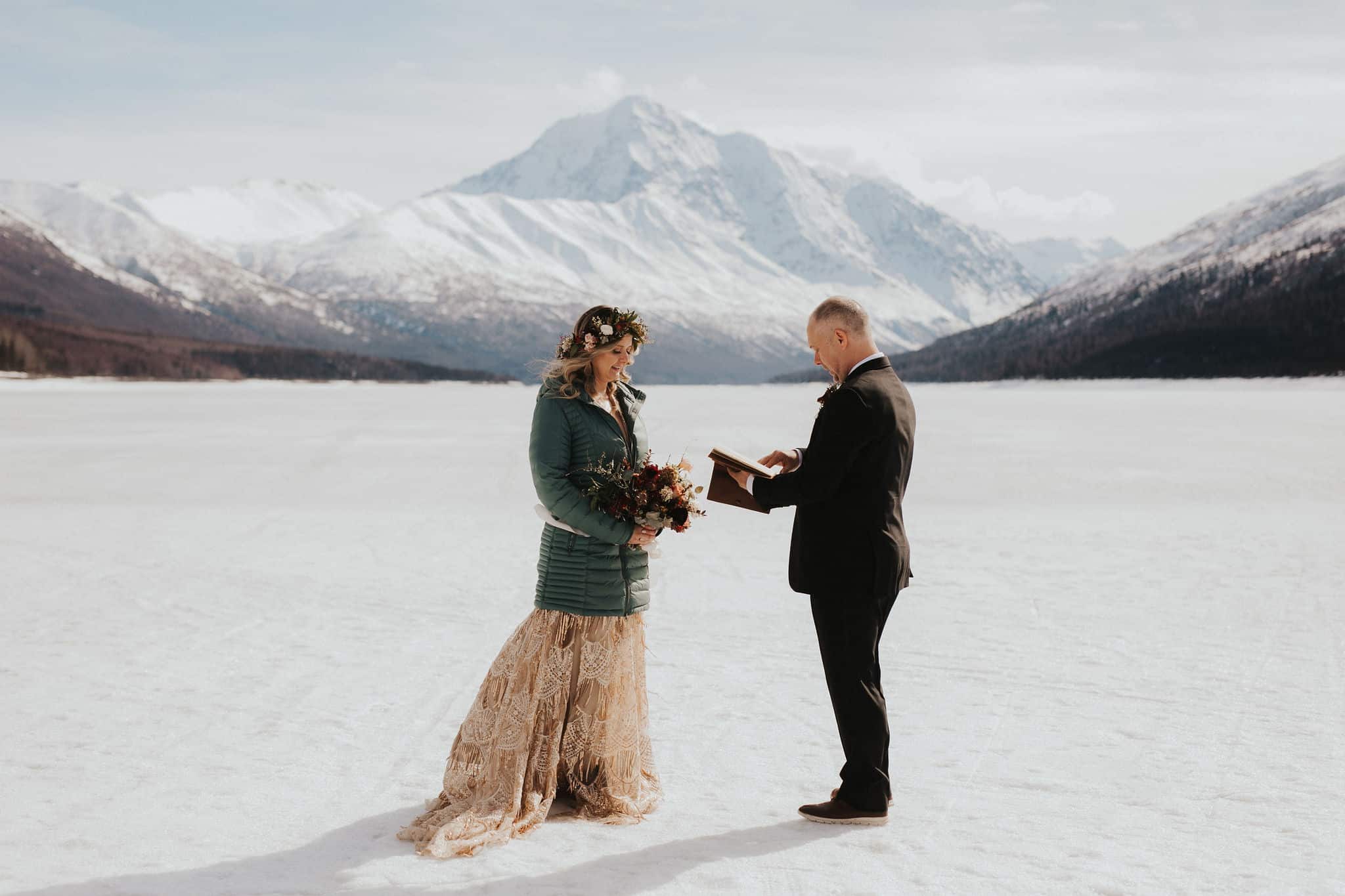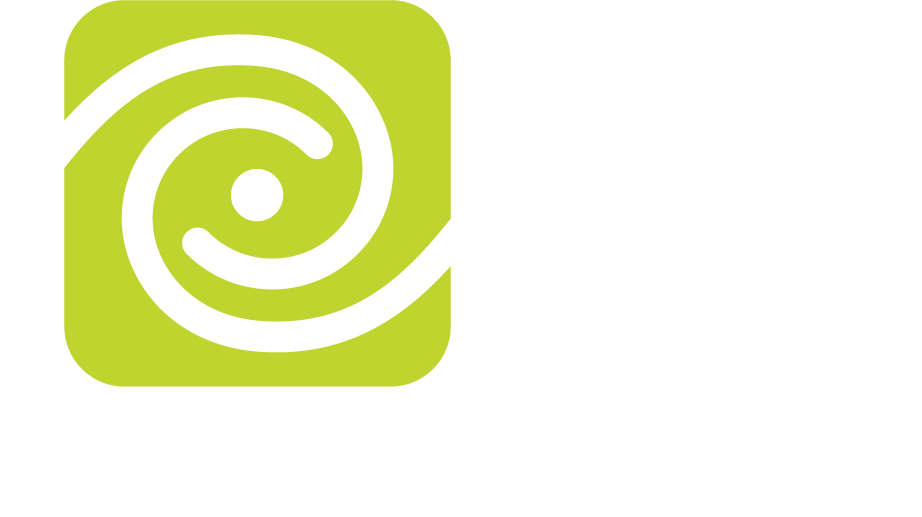-
Top 11 Elopement Locations Outside National Parks
(With Best Seasons, Hiking Info & What to Wear)
While national parks offer incredible landscapes, there are just as many beyond their boundaries that provide the perfect backdrop for your adventure elopement.
11. Valley of Fire, Nevada
-
Spring (March–May): The best season for a comfortable desert elopement, with wildflowers blooming and mild temperatures.
-
Fall (September–November): Another great season with warm days and cool evenings.
-
Winter (December–February): Cooler temperatures make for a pleasant experience, but occasional rain can occur.
-
Summer (June–August): Not recommended due to extreme heat often exceeding 100°F.
-
Fire Wave: A stunning, striped sandstone formation that looks like ocean waves frozen in time.
-
White Domes: Dramatic rock formations with unique slot canyons and beautiful textures.
-
Elephant Rock: A natural arch shaped like an elephant, offering an iconic backdrop.
-
Spring/Fall: Light, breathable fabrics with layers for the cooler evenings.
-
Summer: Light, airy clothing with plenty of sun protection.
-
Winter: Layers, as temperatures can drop significantly at night.
10. Alabama Hills, California
The Alabama Hills in California are one of the most iconic and cinematic desert landscapes in the U.S. Located at the base of the Sierra Nevada Mountains, these unique rock formations create a rugged and stunning backdrop perfect for adventure elopements.
-
Spring (March–May): Warm days and wildflowers in the high desert.
-
Fall (September–November): Crisp air and stunning sunsets make this the perfect time for an elopement.
-
Winter (December–February):
Occasional snow on the Sierra Nevada peaks makes for an epic winter backdrop. -
Summer (June–August): Can be hot, but early mornings and sunset ceremonies work well.
-
Mobius Arch: A famous rock formation framing Mt. Whitney in the background.
-
Movie Road: A winding road through the rock formations, offering endless photo opportunities.
-
Lathe Arch: A smaller but stunning natural arch with panoramic views.
-
Spring/Fall: Comfortable hiking attire with layers for chilly mornings.
-
Summer: Breathable fabrics with sun protection.
-
Winter: Warm layers and a stylish coat for a cozy but adventurous look.
9. Columbia Gorge, Washington
-
Spring (April–June): The waterfalls are at their most powerful, and the greenery is at its peak.
-
Summer (July–August): Warm, sunny weather makes for easy hiking and perfect lighting.
-
Fall (September–November): Stunning golden foliage blankets the area.
-
Winter (December–March): Rainy but enchanting, with misty, moody forests.
-
Latourell Falls: A gorgeous single-drop waterfall with vibrant moss-covered cliffs.
-
Wahclella Falls: A short hike leads to a dreamy two-tiered waterfall.
-
Rowena Crest: A breathtaking viewpoint with sweeping views of the Columbia River.
-
Spring/Fall: Waterproof layers and hiking boots for damp conditions.
-
Summer: Light clothing with sturdy shoes for exploring the trails.
-
Winter: Waterproof outerwear to stay warm and dry.
8. Bonneville Salt Flats, Utah
It’s perfect for couples looking for a The Salt Flats are also incredibly easy to access, just off I-80 from Salt Lake City. The vast openness allows for creative, artistic wedding photography, especially at sunset and sunrise when the sky’s colors reflect on the flats.
-
Spring (March–May): Comfortable temperatures with the potential for reflective water surfaces after winter rain.
-
Fall (September–November): Ideal conditions with fewer visitors and vibrant sunsets.
-
Winter (December–February): Cooler but unique, with potential for mirror-like reflections after rain.
-
Summer (June–August): Extremely hot, but possible for early morning or sunset elopements.
-
Endless Flats: The entire landscape offers panoramic, unbroken scenery for an intimate ceremony.
-
Salt Crust Patterns: Unique textured areas that look stunning in photos.
-
Reflections (Rainy Season): When the flats are wet, they create a perfect mirror effect for an ethereal, floating-on-water aesthetic.
-
Spring/Fall: Light clothing with layers for the cooler evenings.
-
Summer: Light, breathable attire and sunglasses to handle the bright reflections.
-
Winter: Stylish outer layers, as it can be chilly with occasional wind.
7. Snow Canyon, Utah
Snow Canyon is one of Utah’s best-kept secrets for elopements. Nestled in the southwestern part of the state near St. George, this stunning location offers towering red sandstone cliffs, ancient lava flows, and rolling white dunes, making it a dream setting for couples looking for a secluded and adventurous elopement. Unlike some of Utah’s more famous parks, Snow Canyon provides similar dramatic landscapes with far fewer crowds.
-
Spring (March–May): Perfect weather, with comfortable temperatures and blooming desert wildflowers.
-
Fall (September–November): Warm days and cool evenings, making for an ideal outdoor ceremony.
-
Winter (December–February): Mild compared to other locations, with peaceful desert solitude.
-
Summer (June–August): Can be extremely hot, but sunrise and sunset elopements are stunning.
-
Petrified Dunes: A unique, rolling rock landscape with incredible photo opportunities.
-
Jenny’s Canyon: A short hike leading to a picturesque slot canyon.
-
Lava Flow Overlook: Panoramic views of the red rock cliffs with a rugged, adventurous feel.
-
Spring/Fall: Lightweight, breathable fabrics with comfortable hiking shoes.
-
Summer: Loose, airy clothing with sun protection and plenty of water.
-
Winter: Layers for the cooler mornings and evenings, though daytime is usually pleasant.
6. Samuel H. Boardman Scenic Corridor, Oregon
The Samuel H. Boardman Scenic Corridor is one of the most breathtaking coastal landscapes in the Pacific Northwest. Located on the southern Oregon coast, this rugged and dramatic stretch of shoreline is known for its rocky sea stacks, hidden coves, towering cliffs, and lush coastal forests. It offers an elopement setting straight out of a fairytale.
For couples seeking seclusion and raw, untamed beauty, this location is perfect. The foggy mornings, crashing waves, and moss-draped forests make for an incredibly romantic elopement atmosphere.
- Spring (March–May): Mild temperatures, blooming coastal wildflowers, and fewer tourists.
- Summer (June–August): The driest months with long daylight hours, but can be busier.
- Fall (September–November): Crisp air, golden hues in the forests, and fewer visitors.
- Winter (December–February): Moody, dramatic scenery with misty skies and crashing waves.
- Secret Beach: A secluded cove with stunning rock formations and crashing surf.
- Natural Bridges: A jaw-dropping rock arch over turquoise ocean waters.
- Arch Rock Viewpoint: Panoramic coastal views with towering cliffs.
- Spring/Fall: Light rain layers, as weather can be unpredictable.
- Summer: Comfortable clothing with good traction shoes for rocky terrain.
- Winter: Waterproof gear and warm layers for the cooler coastal breeze.
5. Lake Powell & Horseshoe Bend, Utah & Arizona
For couples looking for jaw-dropping desert landscapes combined with stunning water views, Lake Powell and Horseshoe Bend offer a surreal and unforgettable elopement experience. These two locations, which straddle the Utah and Arizona border, feature deep canyon walls, emerald blue waters, and the dramatic curve of the Colorado River, making them some of the most iconic elopement destinations in the Southwest.
-
Spring (March–May): Comfortable temperatures, clear skies, and fewer tourists.
-
Summer (June–August): Extremely hot, but sunrise or sunset elopements are possible.
-
Fall (September–November): Mild weather and golden autumn light create a romantic setting.
-
Winter (December–February): Cool but peaceful, with fewer visitors and stunning desert solitude.
-
Horseshoe Bend Overlook: A breathtaking view high above the winding Colorado River.
-
Lone Rock Beach: A sandy lakeshore with panoramic canyon views, accessible by car.
-
Antelope Canyon (Permit Required): A stunning slot canyon with wave-like rock formations and dramatic lighting.
-
Boat Elopement on Lake Powell: Charter a private boat for an intimate ceremony on the water.
-
Spring/Fall: Light, breathable fabrics with layers for early morning and evening temperature shifts.
-
Summer: Loose, airy attire with plenty of sun protection and hydration.
-
Winter: Warm layers, as desert mornings and evenings can be chilly.
4. La Push, Washington
For couples who love rugged coastlines, misty beaches, and towering sea stacks, La Push in Washington is an unbeatable elopement destination. Located on the Olympic Peninsula, La Push offers a wild, untamed beauty with dramatic rock formations rising from the ocean, driftwood-covered beaches, and lush coastal forests.
- Spring (March–May): Greenery is at its peak, with occasional mist creating a mystical atmosphere.
- Summer (June–August): Best weather, with long daylight hours and calmer seas.
- Fall (September–November): Moody, misty settings with fewer tourists.
- Winter (December–February): Dramatic and stormy, perfect for couples who love the Pacific Northwest’s raw beauty.
- Second Beach: A short hike leads to one of the most picturesque coastal views in Washington.
- First Beach: Easy to access, with dramatic ocean waves and driftwood-strewn shores.
- Rialto Beach: A stunning, moody beach with unique sea stacks and crashing surf.
- Spring/Fall: Waterproof layers and hiking boots, as trails can be muddy.
- Summer: Comfortable, breathable attire with good traction shoes for the beach.
- Winter: Insulated rain gear and warm layers for the chilly ocean air.
3. Artist Point & Heather Meadows, Washington
If you’re looking for a breathtaking alpine elopement, Artist Point and Heather Meadows in Washington are hard to beat. Located near Mount Baker, these locations offer jagged snow-capped peaks, wildflower-filled meadows, reflective alpine lakes, and some of the most epic mountain backdrops in the Pacific Northwest.
-
Summer (July–September): Wildflowers are in full bloom, and roads are open.
-
Fall (September–October): Gorgeous golden foliage, crisp mountain air, and fewer crowds.
-
Winter/Spring (November–June): The area is covered in deep snow, but can be accessed for winter elopements via snowshoeing.
-
Artist Point: A panoramic mountain overlook with views of Mount Shuksan and Mount Baker.
-
Bagley Lakes: A short, scenic trail leading to a peaceful alpine lake.
-
Table Mountain: A moderate hike with breathtaking 360-degree views of the Cascades.
-
Summer/Fall: Layered hiking-friendly attire and good hiking boots.
-
Winter: Insulated layers, snow boots, and waterproof gear for snowshoeing.
2. Knik Glacier, Alaska
For couples who want a once-in-a-lifetime, jaw-dropping elopement experience, Knik Glacier in Alaska delivers. This remote and stunning ice field is only accessible by helicopter, making it an exclusive, private, and surreal location to exchange vows.
Imagine standing on an ancient glacier, surrounded by towering ice walls and deep blue ice caves. The glacier’s surface is constantly shifting, offering a one-of-a-kind elopement experience that no other couple will have in exactly the same way.
- Summer (June–August): The best time for stable weather and clear glacier landings.
- Fall (September–October): Crisp air and stunning autumn hues in the surrounding mountains.
- Winter (November–March): Magical snow-covered landscapes, but temperatures can be extreme.
- Glacier Landing Zone: Helicopter-accessible ice formations perfect for an elopement ceremony.
- Blue Ice Caves: Seasonal caves carved by melting ice, creating stunning natural ice cathedrals.
- Surrounding Mountain Ridges: Sweeping panoramic views over Alaska’s untouched wilderness.
- Year-Round: Insulated waterproof clothing, gloves, and warm layers to handle glacial temperatures.
- Summer: Light hiking gear with layers for unpredictable mountain weather.
- Winter: Full winter gear, including snow boots and windproof jackets.
1. Hatcher Pass, Alaska
Hatcher Pass is Alaska’s best-kept secret for elopements, offering rolling green tundra, wildflower meadows, rugged peaks, and historic mining ruins. Unlike many remote Alaskan elopement spots, Hatcher Pass is accessible by car, making it one of the easiest ways to have a truly wild and scenic elopement without requiring a plane or helicopter ride.
-
Summer (June–August): Vibrant green landscapes, long daylight hours, and wildflowers.
-
Fall (September–October): The tundra turns golden, creating one of the most beautiful autumn settings.
-
Winter (November–April): A magical snow-covered wonderland for couples who love winter adventures.
-
Summit Lake: A stunning alpine lake surrounded by rugged peaks.
-
Gold Mint Trail: A scenic valley with views of glaciers and flowing rivers.
-
Independence Mine: A historic mining site with unique backdrops and mountain scenery.
-
Summer: Comfortable hiking attire with layers for chilly mornings.
-
Fall: Warm layers to handle the cool, crisp mountain air.
-
Winter: Full winter gear, insulated boots, and snow-ready outfits for a cozy and magical elopement.
Conclusion: The Advantages of Eloping Beyond National Parks
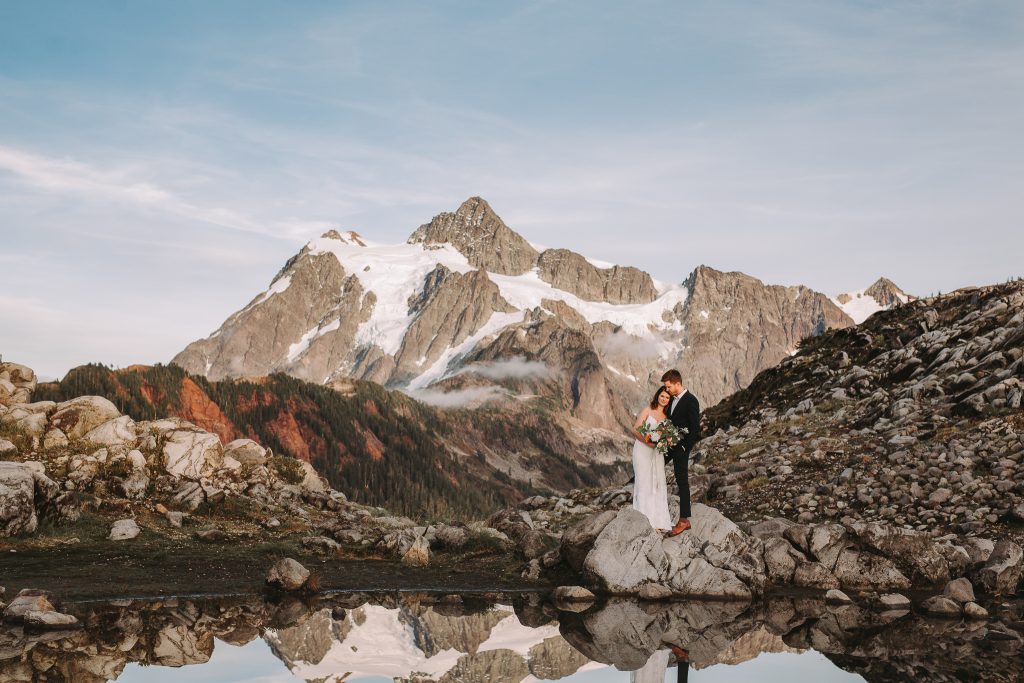
In contrast, lesser-known locales or state parks typically experience fewer visitors, allowing for a more private and personalized ceremony.
Additionally, eloping outside national parks can offer greater flexibility in terms of ceremony locations and regulations. National parks often have strict guidelines and designated areas for ceremonies, which can limit a couple’s options. Alternative venues may provide more freedom to choose a spot that truly resonates with your vision, be it a secluded beach, a mountaintop, or a tranquil forest clearing.
This packet provides detailed information on fees, regulations, and the application process to ensure your ceremony complies with park policies.

